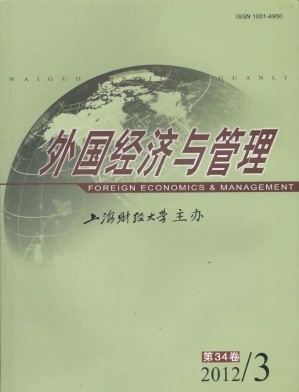基于行为认知视角的组织声誉研究前沿探析与展望
外国经济与管理 2012 年 第 34 卷第 03 期, 页码:65 - 71
摘要
参考文献
摘要
诸多商业企业伦理丑闻引发了人们对于组织声誉内涵与价值的重新审视。如何通过构建良好的组织声誉来实现组织可持续发展,已经成为决定组织能否成功的一大关键问题。本文首先在基于以往组织声誉研究对组织声誉概念的基本内涵和演进过程做出总结归纳的基础上,提出行为认知视角下的组织声誉界定,进而基于对近期实证研究结果的述评,对该视角下组织声誉的前因与效能机制展开综合探析,并对未来组织声誉研究的前沿方向与问题做出展望。
[1]Arend R J.Reputation for cooperation:Contingent benefits in alliance activity[J].Strategic Management Journal,2009,30(4):371-385.
[2]Bartikowski B and Walsh G.Investigating mediators between corporate reputation and customer citizenship behaviors[J].Journal of Business Research,2011,64(1):39-44.
[3]Bitektine A.Toward a theory of social judgments of organiza-tions:The case of legitimacy,reputation,and status[J].Acade-my of Management Review,2011,36(1):151-179.
[4]Coyne E E.Reputation as information:A multilevel approach to reputation in organizations[D].The Ohio State University,2010.
[5]Chun R and Davies G.The effect of merger on employee views of corporate reputation:Time and space dependent theory[J].Industrial Marketing Management,2010,39(5):721-727.
[6]Deephouse D L and Carter S M.An examination of differences between organizational legitimacy and organizational reputa-tion[J].Journal of Management Studies,2005,42(2):329-261.
[7]Dranove D and Shanley M.Cost reductions or reputation enhancement as motives for mergers:The logic of multihospital systems[J].Strategic Management Journal,1995,16(1):55-74.
[8]Dutton J E,et al.Organizational images and member identifi-cation[J].Administrative Science Quarterly,1994,39(2):239-263.
[9]Fischer E and Reuber R.The good,the bad,and the unfami-liar:The challenges of reputation formation facing new firms[J].Entrepreneurship:Theory and Practice,2007,31(1):53-75.
[10]Fombrun C.Reputation:Realizing value from the corporate image[M].Boston:Harvard Business School Press,1996.
[11]Fombrun C and Shanley M.What’s in a name?Reputation building and corporate strategy[J].Academy of Management Journal,1990,33(2):233-258.
[12]Gray E B and Balmer J M T.Managing corporate image and corporate reputation[J].Long Range Planning,1998,31(5):695-702.
[13]Hirsch B and Meyer M.Integrating soft factors into the as-sessment of cooperative relationships between firms:Accoun-ting for reputation and ethical values[J].Business Ethics:A European Review,2010,19(1):81-94.
[14]Hong S and Yang S U.Effects of reputation,relational satis-faction,and customer-company identification on positive word-of-mouth intentions[J].Journal of Public Relations Re-lations Research,2009,21(4):381-403.
[15]Lange D,et al.Organizational reputation:A review[J].Jour-nal of Management,2011,37(1):153-184.
[16]Nguyen N.Competence and benevolence of contact personnel in the perceived corporate reputation:An empirical study in financial services[J].Corporate Reputation Review,2010,12(4):345-356.
[17]Pfarrer M D,et al.A tale of two assets:The effects of firm reputation and celebrity on earnings surprises and investors’reactions[J].Academy of Management Journal,2010,53(5):1131-1152.
[18]Rhee M.Does reputation contribute to reducing organization-al errors?A learning approach[J].Journal of Management Studies,2009,46(4):676-703.
[19]Rhee M and Haunschild P R.The liability of good reputa-tion:A study of product recalls in the U.S.automobile in-dustry[J].Organization Science,2006,17(1):101-120.
[20]Sims R.Toward a better understanding of organizational ef-forts to rebuild reputation following an ethical scandal[J].Journal of Business Ethics,2009,90(4):453-472.
[21]Standifird S S.Perceived institutional stability and organiza-tional reputation:The impact for firms traded on the Warsaw Stock Exchange[J].Corporate Reputation Review,2003,6(2):133-148.
[22]Walker K.A systematic review of the corporate reputation literature:Definition,measurement,and theory[J].Corporate Reputation Review,2010,12(4):357-387.
[23]Weigelt K and Camerer C.Reputation and corporate strate-gy:A review of recent theories[J].Strategic Management Journal,1988,9(5):443-454.
[24]Yang S U.An integrated model for organization-public rela-tional outcomes,organizational reputation,and their anteced-ents[J].Journal of Public Relations Research,2007,19(2):91-121.
[25]宝贡敏,徐碧祥.国外企业声誉理论研究述评[J].科研管理,2007,28(3):98-107.
[26]邓晓辉.企业研究新视角:企业声誉理论[J].外国经济与管理,2004,26(6):14-19.
[27]莫申江,王重鸣.国外商业伦理研究回顾与展望[J].外国经济与管理,2009,31(7):16-22.
[28]莫申江,王重鸣.转型时期民营企业组织伦理构思的案例研究[J].管理案例研究与评论,2009,2(6):366-379.
[29]莫申江,王重鸣.国外伦理型领导研究前沿探析[J].外国经济与管理,2010,32(2):32-37.
[30]徐金发,刘靓.企业声誉定义及测量研究综述[J].外国经济与管理,2004,26(9):25-30.
[2]Bartikowski B and Walsh G.Investigating mediators between corporate reputation and customer citizenship behaviors[J].Journal of Business Research,2011,64(1):39-44.
[3]Bitektine A.Toward a theory of social judgments of organiza-tions:The case of legitimacy,reputation,and status[J].Acade-my of Management Review,2011,36(1):151-179.
[4]Coyne E E.Reputation as information:A multilevel approach to reputation in organizations[D].The Ohio State University,2010.
[5]Chun R and Davies G.The effect of merger on employee views of corporate reputation:Time and space dependent theory[J].Industrial Marketing Management,2010,39(5):721-727.
[6]Deephouse D L and Carter S M.An examination of differences between organizational legitimacy and organizational reputa-tion[J].Journal of Management Studies,2005,42(2):329-261.
[7]Dranove D and Shanley M.Cost reductions or reputation enhancement as motives for mergers:The logic of multihospital systems[J].Strategic Management Journal,1995,16(1):55-74.
[8]Dutton J E,et al.Organizational images and member identifi-cation[J].Administrative Science Quarterly,1994,39(2):239-263.
[9]Fischer E and Reuber R.The good,the bad,and the unfami-liar:The challenges of reputation formation facing new firms[J].Entrepreneurship:Theory and Practice,2007,31(1):53-75.
[10]Fombrun C.Reputation:Realizing value from the corporate image[M].Boston:Harvard Business School Press,1996.
[11]Fombrun C and Shanley M.What’s in a name?Reputation building and corporate strategy[J].Academy of Management Journal,1990,33(2):233-258.
[12]Gray E B and Balmer J M T.Managing corporate image and corporate reputation[J].Long Range Planning,1998,31(5):695-702.
[13]Hirsch B and Meyer M.Integrating soft factors into the as-sessment of cooperative relationships between firms:Accoun-ting for reputation and ethical values[J].Business Ethics:A European Review,2010,19(1):81-94.
[14]Hong S and Yang S U.Effects of reputation,relational satis-faction,and customer-company identification on positive word-of-mouth intentions[J].Journal of Public Relations Re-lations Research,2009,21(4):381-403.
[15]Lange D,et al.Organizational reputation:A review[J].Jour-nal of Management,2011,37(1):153-184.
[16]Nguyen N.Competence and benevolence of contact personnel in the perceived corporate reputation:An empirical study in financial services[J].Corporate Reputation Review,2010,12(4):345-356.
[17]Pfarrer M D,et al.A tale of two assets:The effects of firm reputation and celebrity on earnings surprises and investors’reactions[J].Academy of Management Journal,2010,53(5):1131-1152.
[18]Rhee M.Does reputation contribute to reducing organization-al errors?A learning approach[J].Journal of Management Studies,2009,46(4):676-703.
[19]Rhee M and Haunschild P R.The liability of good reputa-tion:A study of product recalls in the U.S.automobile in-dustry[J].Organization Science,2006,17(1):101-120.
[20]Sims R.Toward a better understanding of organizational ef-forts to rebuild reputation following an ethical scandal[J].Journal of Business Ethics,2009,90(4):453-472.
[21]Standifird S S.Perceived institutional stability and organiza-tional reputation:The impact for firms traded on the Warsaw Stock Exchange[J].Corporate Reputation Review,2003,6(2):133-148.
[22]Walker K.A systematic review of the corporate reputation literature:Definition,measurement,and theory[J].Corporate Reputation Review,2010,12(4):357-387.
[23]Weigelt K and Camerer C.Reputation and corporate strate-gy:A review of recent theories[J].Strategic Management Journal,1988,9(5):443-454.
[24]Yang S U.An integrated model for organization-public rela-tional outcomes,organizational reputation,and their anteced-ents[J].Journal of Public Relations Research,2007,19(2):91-121.
[25]宝贡敏,徐碧祥.国外企业声誉理论研究述评[J].科研管理,2007,28(3):98-107.
[26]邓晓辉.企业研究新视角:企业声誉理论[J].外国经济与管理,2004,26(6):14-19.
[27]莫申江,王重鸣.国外商业伦理研究回顾与展望[J].外国经济与管理,2009,31(7):16-22.
[28]莫申江,王重鸣.转型时期民营企业组织伦理构思的案例研究[J].管理案例研究与评论,2009,2(6):366-379.
[29]莫申江,王重鸣.国外伦理型领导研究前沿探析[J].外国经济与管理,2010,32(2):32-37.
[30]徐金发,刘靓.企业声誉定义及测量研究综述[J].外国经济与管理,2004,26(9):25-30.
引用本文
莫申江, 王重鸣. 基于行为认知视角的组织声誉研究前沿探析与展望[J]. 外国经济与管理, 2012, 34(3): 65–71.
导出参考文献,格式为:
上一篇:后发企业能力追赶研究探析与展望
下一篇:组织情境下的权力研究述评





 7852
7852  252
252

